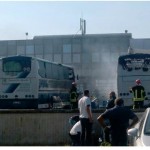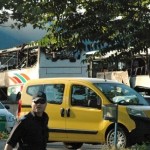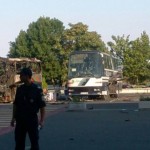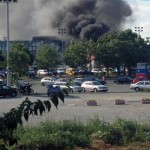A Psychological Exploration of Communist and Post Communist Bulgaria
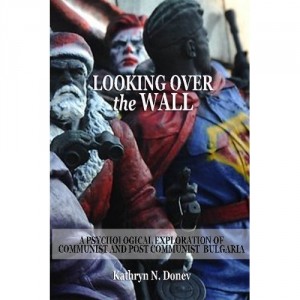 From an environment of uncertainty and hopelessness, the Bulgarian Evangelical believer turns to the continuity of faith in the Almighty Redeemer. Pentecostalism as practical Christianity gives a sense of internal motivation to the discouraged. In a society that is limited in conduciveness for progression of thought or self actualization, one finds refuge in the promises of Christianity. It becomes a certainty which can be relied upon. Historically, having undergone severe persecution, the Bulgarian Evangelical believer is one who possesses great devotion to his or her belief. Having to defend the faith fosters a deep sense of appreciation and in an impoverished country, faith becomes all some have. Christ becomes the only one to whom to turn for provision. In the midst of this complete dependence is where miracles occur. Furthermore, it is in the midst of miracles where the skepticism which is prominent in post communist Bulgaria is broken. When those who believe are healed from cancer and even raised from the dead, there is no room for disbelief or low self-esteem.
From an environment of uncertainty and hopelessness, the Bulgarian Evangelical believer turns to the continuity of faith in the Almighty Redeemer. Pentecostalism as practical Christianity gives a sense of internal motivation to the discouraged. In a society that is limited in conduciveness for progression of thought or self actualization, one finds refuge in the promises of Christianity. It becomes a certainty which can be relied upon. Historically, having undergone severe persecution, the Bulgarian Evangelical believer is one who possesses great devotion to his or her belief. Having to defend the faith fosters a deep sense of appreciation and in an impoverished country, faith becomes all some have. Christ becomes the only one to whom to turn for provision. In the midst of this complete dependence is where miracles occur. Furthermore, it is in the midst of miracles where the skepticism which is prominent in post communist Bulgaria is broken. When those who believe are healed from cancer and even raised from the dead, there is no room for disbelief or low self-esteem.
Insight into Communist Agent Techniques in Bulgaria
 In light of exploring the mentality of the Bulgarian people, the following is a personal account of the pressures and techniques used by the Bulgarian Secret Services during communism. The report shows testimony to how agents directly or indirectly got themselves involved by using three basic strategies according to the victim:
In light of exploring the mentality of the Bulgarian people, the following is a personal account of the pressures and techniques used by the Bulgarian Secret Services during communism. The report shows testimony to how agents directly or indirectly got themselves involved by using three basic strategies according to the victim:
1. “‘Soft’ breaking of the personal will by method of blackmail, transformation of refusal into ‘consent’ and making the free personality into an instrument deprived of will in the hands of the secret services;
2. Brutal suspension from scientific work, deprivation of the scholar to find any employment position, including the lowest qualified employment for him to earn his family’s daily bread, placement of his family-members to various methods of pursuit and repression;
3. Savage violation on the scholar, on grounds of definite ideological statements, provided by law, by sending him to a hospital for the mentally ill, to a labor camp for ‘re-education’ by means of primitive and sweat physical labor or at prison’s special rigid regime.”
Iankov, I. Psychology of Law Value in Communist and Post-Communist Bulgaria. First International Conference on Therapeutic Jurisprudence. (Winchester, United Kingdom of Great Britain. July 8-11, 1998): 2-5.
RELATED ARTICLES:
[ ] Obama, Marxism and Pentecostal Identity
[ ] A Psychological Exploration of Communist and Post Communist Bulgaria
[ ] Insight into Communist Agent Techniques in Bulgaria
[ ] The Bulgarian Evangelical Believer and Communistic Consequences
[ ] Distinct Historical Memories of the Bulgarian Mindset
[ ] National Identity and Collective Consciousness of the Bulgarian Community
Bulgaria’s ethnic party leader attacked by armed assailant
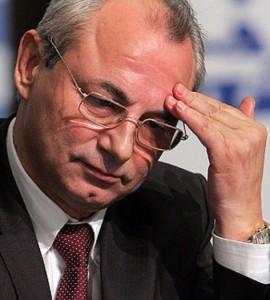 BBC World News, Sofia – BULGARIA
BBC World News, Sofia – BULGARIA
A man put a gun to the head of the leader of Bulgaria’s ethnic Turkish party during a televised conference.
Ahmed Dogan, leader of the Movement for Rights and Freedoms (MRF) was unharmed and the unidentified man was wrestled to the ground by security guards. The incident happened on Saturday at a party congress in the capital Sofia.
Interior Minister Tsvetan Tsvetanov said the attacker tried to fire two shots but “most likely the gun misfired”. He also said the assailant had a criminal record for drugs possession, robberies and hooliganism. Police arrested the attacker, a 25-year-old from the Black Sea town of Burgas, who was also carrying two knives.
The liberal MRF party represents ethnic Turks and other Muslims, who make up about 12% of Bulgaria’s population of about seven million. Mr Dogan, 58, has lead the party for almost 25 years. He returned to the party conference a few hours after the attack and was given a standing ovation.
President Rosen Plevneliev said in a statement: “Bulgarian society is traditionally known for its tolerance, mutual acceptance and respect between different ethnic groups and religions. “Such an act is unacceptable in a democratic state.” Attacks on politicians are rare in Bulgaria, but in 1996, former Prime Minister Andrei Lukanov was found shot dead near his home in Sofia
Patriarch Maxim, Eastern Orthodox Church Leader of Bulgaria, Dies at 98
 SOFIA, Bulgaria (AP) — Patriarch Maxim of Bulgaria, who weathered a revolt over his Communist-era ties to lead his country’s Orthodox Christians for more than 40 years, died here on Tuesday. He was 98. Patriarch Maxim’s tenure as the church’s leader bridged Bulgaria’s transition from Communism.
SOFIA, Bulgaria (AP) — Patriarch Maxim of Bulgaria, who weathered a revolt over his Communist-era ties to lead his country’s Orthodox Christians for more than 40 years, died here on Tuesday. He was 98. Patriarch Maxim’s tenure as the church’s leader bridged Bulgaria’s transition from Communism.
Orthodox Christianity is Bulgaria’s dominant religion, followed by more than 80 percent of the country’s 7.4 million people. Patriarch Maxim’s tenure as the church’s leader bridged the country’s transition from Communism, and he withstood efforts to oust him by the new democratic government and by rebel priests who saw him as a Communist ally. Born Marin Naidenov Minkov on Oct. 29, 1914, he graduated from the Sofia Seminary in 1935 and entered Sofia University’s theology department in 1938, before rising through the church ranks to be named patriarch on July 4, 1971.
After the collapse of Communism in 1989, Bulgaria’s new democratic government sought to replace Communist-appointed figureheads, including the patriarch. The church split between supporters of Patriarch Maxim and breakaway clergymen, who tried to oust him and then formed their own synod. The division plunged the church into turmoil, with church buildings being occupied, priests breaking into fistfights on church steps, and water cannons and tear gas being turned on rebel bishops to clear the main St. Alexander Nevsky cathedral in Sofia. For more than a decade the two synods existed side by side. The schism ended in 2010, when the head of the alternative synod called for healing and the synod was dissolved.
Patriarch Maxim was hailed for meeting with Pope John Paul II during the pontiff’s visit to Sofia in 2002, a trip seen as warming the frosty relationship between the Orthodox Church and the Vatican. The Holy Synod of 13 senior clergy members will choose an interim patriarch until a larger Church Council is held within four months to pick Patriarch Maxim’s successor, church officials said.
So, what do you eat over there?
 An introduction to Cooking Traditions of Bulgaria
An introduction to Cooking Traditions of Bulgaria
After 11 years of higher education and three earned degrees in theology, there is still one question I have difficulties answering. I stumble every time when inquiring of our missions work in Bulgaria or just interested in the local culture someone asks me, “So what do you eat over there?” My short answer generally is: “Food!” But that hardly covers it all.
Kathryn has done a fine job answering this question through her new book with 50 authentic Bulgarian recipes. This is not just what Bulgarians eat in general, but what we have eaten during our missionary travels sitting around the table of hospitable brothers and sisters in the Lord.
They are truly Pentecostal recipes. And not because they were served “in the Spirit,” but because they were often done through what I perceive to be the one true Pentecostal confessions of the Bible “Silver and gold have I none, but what I have I give unto you…” For many of them we have shared with brothers and sisters living in the complete poverty of the mission field, yet willing like the widow of Elijah’s time to share their last bread with the ministers of God.
This is what makes these recipes truly missional. I cannot say that I have personally cooked them, but I can assure you I have personally eaten them all and enjoyed everyone and each of them after five long services on Sunday, a three day church fast or a night of crossing the snow covered Balkan Mountains. I challenge you to cook some of them for your family or church and send us feedback about your experience with the answer of the question so many of you have asked me through the years. May be next time we see each other, we can ask you “How do you like what we eat over there?”
Preview and Purchase Your Copy at: Amazon.com
Looking Over the Wall: A Psychological Exploration of Communist and Post Communist Bulgaria
 Looking Over the Wall: A Psychological Exploration of Communist and Post Communist Bulgaria
Looking Over the Wall: A Psychological Exploration of Communist and Post Communist Bulgaria
This book is the result of over a decade of research and personal experiences of living in Bulgaria for the past seven years. It embodies documents, articles, personal interviews and essays dealing with psychological explorations of communist and post communist Bulgaria. Along with a historical overview of Bulgaria, the author presents the development of psychotherapy throughout the country and addresses future concerns for the state of counseling within a post communist context. Furthermore, the author examines the Pentecostal experience of the Bulgarian evangelical believer drawing on a paper presented at the 36th annual Society of Pentecostal Studies Conference. As well included is original research which develops a theoretical account of the sequences of internal motivation in addition to student survey results regarding counseling practices from the first Master’s in Chaplaincy Ministry Program in Europe at the Bulgarian Evangelical Theological Institute.
Preview and Purchase Your Copy at Amazon.com
Cooking Traditions of Bulgaria (Second Edition)
 Bulgarian cuisine is distinct, yet eclectic at the same time with Mediterranean influence and flavors of its surrounding countries. Bulgaria borders the Black Sea, between Romania and Turkey. Greece is also a neighbor, along with Serbia and Macedonia to the west. This cookbook features 50 personal, but authentic recipes in attempts to further the tradition of keeping alive century old recipes of Bulgarian cuisine. I have tried to keep the recipes as authentic as possible with using American based ingredients and with every dish, dessert or drink there is a story to be told…
Bulgarian cuisine is distinct, yet eclectic at the same time with Mediterranean influence and flavors of its surrounding countries. Bulgaria borders the Black Sea, between Romania and Turkey. Greece is also a neighbor, along with Serbia and Macedonia to the west. This cookbook features 50 personal, but authentic recipes in attempts to further the tradition of keeping alive century old recipes of Bulgarian cuisine. I have tried to keep the recipes as authentic as possible with using American based ingredients and with every dish, dessert or drink there is a story to be told…
Preview and Purchase Your Copy at:
Amazon.com
Prayer for Bulgaria: 7 Dead after Suicide Bombing at Bourgas Airport
July 18, 2012 – Bourgas, BULGARIA
At least seven people are dead and dozens are injured after a suicide bombing targeting Israeli tourists vacationing in Bulgaria. The bus was carrying mostly Israeli youth when it exploded on Wednesday July 18, 2012, police and hospital officials say. Two pregnant women and an 11 year old child are among the injured.
The blast occurred shortly after someone boarded the vehicle transporting Israeli tourist from Tel Aviv around 5:00 PM local Bulgarian time. A total of 146 adults and 8 children were traveling with “Air Via” charter flight 392.
According to BBC News, Israeli Prime Minister Benjamin Netanyahu claimed “All the signs lead to Iran” and “Israel will respond forcefully to Iranian terror. Iran has made no public comments to the Israeli accusations.” Russian InterFax published an immediate denial of the accusation on behalf of right wing Shi’a Islamic terrorist organization Hezbollah.
This terrorist attack is unprecedented for any country member of the European Union. The targeted location at the Black Sea, and not the capital Sofia, is the closest possible border point between Europe and the Middle East. For the Bulgarian people, this attack is as traumatic as the 9/11 attack was for the American people.
Meanwhile, the United States condemned the deadly attack on Israeli tourists in Bulgaria, as White House press secretary Jay Carney said Carney declared that the US stands with the Israeli people and the people of Bulgaria.
In January, 2012 there were reports that Israel had asked Bulgaria to tighten security for Israeli tourists traveling by bus. This followed a reported discovery of a suspicious package found on a bus with Israeli tourists traveling from Turkey to Bulgaria. CIA Director Petraeus also visited Bulgaria on unannounced trip in June of this year.
Currently, the Bourgas airport has been closed and flights are being diverted to Varna. All airports, bus and train stations remain under a close watch after Bulgaria’s capital mayor called for tightened security measures.
Bourgas is a Black Sea port city just over an hour drive from our base location of Yambol, Bulgaria. The First Pentecostal church on the Balkans was founded in Bourgas in 1920 by Assemblies of God missionaries, Donisey Zaplishny and Ivan Voronaev and consecutively lead to the establishment of the Bulgarian Church of God in 1928.
Read more:
Netanyahu Vows ‘Forceful Response to Iranian Terror’: All signs are that Iran and Hizbullah are behind blast, on the 18th anniversary of the AMIA attack in Argentina that killed 85.
FOX News: Explosion targets Israeli tourists in Bulgaria
The TIMES: Israeli tourists killed in bus bombing
Novinite.com: Israeli Tourists’ Bus Blast in Bulgaria Terrorist Attack
CNN: Official: Three dead in Bulgaria bus blast
Haaretz: 7 reported killed in terror attack against Israelis in Bulgaria
BBC: Explosion hits a bus carrying Israeli tourists in Bulgaria
The Jerusalem Post: 3 dead in suicide bombing on Israeli bus in Bulgaria
AFP: Three dead in Bulgaria bus blast
Financial Times: Bulgaria bus blast kills Israeli tourists
White House: Statement by U.S. President on the Terrorst Attack in Bulgaria
U.S. Department of State: Statement by Secretary of State on the Attacks in Bulgaria
Our Ministry Map in Bulgaria
View Mission BULGARIA in a larger map
John The Baptist’s Bones Found In Bulgaria
John the Baptist’s Bones Found? | Source: University of Oxford
Bones that are theorized to be the bones of John the Baptist have recently been dated to the 1st century AD, confirmed as a male, and also found to be from an mtDNA haplogroup that is most common in the Middle East region he would have been from. The bones were found in 2010 during an excavation under an old church in Bulgaria called Sveti Ivan, which translates as St. John. Under the church, in a small marble sarcophagus near the altar, was a knucklebone, a tooth, and part of a cranium. Three animal bones were also found inside the sarcophagus. Only one of the human bones found still contained enough collagen to be radiocarbon dated.
This new research from Oxford University will be presented in a documentary called ‘Head of John the Baptist’ airing on the National Geographic Channel in the UK June 17th. A team from the Oxford Radiocarbon Accelerator Unit at Oxford University dated the knucklebone, that was taken from a right hand, to the first century AD. The researchers were surprised by this, but have specified that without better evidence there is no way to prove that the bones belonged to John the Baptist.
Professor Thomas Higham said: “We were surprised when the radiocarbon dating produced this very early age. We had suspected that the bones may have been more recent than this, perhaps from the third or fourth centuries. However, the result from the metacarpal hand bone is clearly consistent with someone who lived in the early first century AD. Whether that person is John the Baptist is a question that we cannot yet definitely answer and probably never will.”
Researchers from the University of Copenhagen also contributed by reconstructing the mitochondrial DNA genome sequence from three of the bones. They established that all the bones came from the same person, and also that they were from mtDNA haplogroup that is most common in the Middle East, which is where John the Baptist was from. They also established that the bones were from a male.
Dr Hannes Schroeder said: “Our worry was that the remains might have been contaminated with modern DNA. However, the DNA we found in the samples showed damage patterns that are characteristic of ancient DNA, which gave us confidence in the results. Further, it seems somewhat unlikely that all three samples would yield the same sequence considering that they had probably been handled by different people. Both of these facts suggest that the DNA we sequenced was actually authentic. Of course, this does not prove that these were the remains of John the Baptist but nor does it refute that theory as the sequences we got fit with a Near Eastern origin.”
The archaeologists who discovered the bones also found a small box made out of hardened volcanic ash close to the sarcophagus. The box contained inscriptions in Greek that directly referenced John the Baptist and his feast day, asking God to ‘help your servant Thomas’. “One theory is that the person referred to as Thomas had been given the task of bringing the relics to the island. An analysis of the box has shown that the tuff box has a high waterproof quality and is likely to have originated from Cappadocia, a region of modern-day Turkey. The Bulgarian researchers believe that the bones probably came to Bulgaria via Antioch, an ancient Turkish city, where the right hand of St John was kept until the tenth century.”
In a separate study by Oxford researchers, it was found using historical documents that, in the fourth century AD, monks had taken relics of John the Baptist out of Jerusalem, including parts of his skull. “These relics were soon summoned to Constantinople by the Roman Emperor who built a church to house them there. These relics were soon summoned to Constantinople by the Roman Emperor who built a church to house them there. Further research by Dr Kazan suggests that the reliquary used to contain them may have resembled the sarcophagus-shaped casket discovered at Sveti Ivan. Archaeological and written records suggest that these reliquaries were first developed and used at Constantinople by the city’s ruling elite at around the time that the relics of John the Baptist are said to have arrived there.”
Dr Kazan said, “My research suggests that during the fifth or early sixth century, the monastery of Sveti Ivan may well have received a significant portion of St John the Baptist’s relics, as well as a prestige reliquary in the shape of a sarcophagus, from a member of Constantinople’s elite. This gift could have been to dedicate or rededicate the church and the monastery to St John, which the patron or patrons may have supported financially.”


